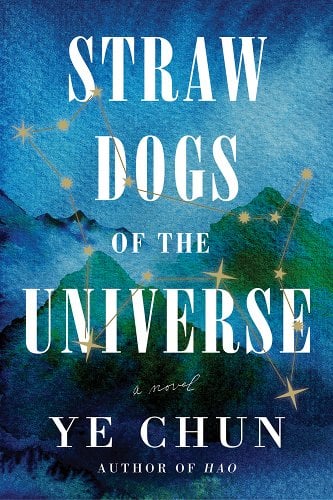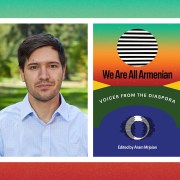[ad_1]
Straw Dogs Of The Universe is a multigenerational epic packed with action and adversity— but its heroes are mere humans, who must rely on luck and grit for a chance to surmount the terror of being a Chinese migrant in 19th century California. Devalued by railroad bosses, enslaved by brothel owners, and hunted down in the streets, every day is a challenge and every triumph is fleeting. In her debut English-language novel, Ye Chun chronicles the lives and dreams of her protagonists with utmost honesty and respect.
I had the pleasure of talking to Ye Chun about the origins of her novel, the responsibilities she feels as a writer chronicling this piece of history, and what it means to be a straw dog of the universe.
This interview has been edited for clarity and length.

Katherine Jin
Straw Dogs Of The Universe explores the lives of Chinese men and women eking out a living in nineteenth century California, where anti-Chinese rhetoric and violence is rampant. What drew you to writing about this subject?
Ye Chun
I co-taught an interdisciplinary course with a history professor several years ago on East and West encounters. One of the units was about Asian immigration to America. I was struck by how much I didn’t know, such as the fact that ninety percent of the Central Pacific Railroad workers were Chinese, without whom the transcontinental railroad could not have been built. And that the first U.S. immigration law was the Chinese Exclusion Act of 1882, explicitly targeting Chinese and Chinese Americans. I figured there were two main reasons for my ignorance: First, my education here had been centered around white experience. Second, Asian American experience had been largely excluded from public discourse. So, after finishing Hao, I began learning about this history more in depth, and the best way for me to learn was to write about it.
Also, I have an ancestor, my father’s great-grandfather, who came here to build the transcontinental railroad in the 1860s and stayed for twenty years before returning to China. There’s that personal connection as well.
Katherine Jin
One thing I love about Straw Dogs Of The Universe is that it offers a glimpse into the lives of individuals that we usually see in aggregate. Plenty of books tell you that thousands of Chinese men arrived by sea to work on the railroad and mine for gold, but they don’t tell you about their personalities, their family and social lives, or what they dream about. Additionally, Chinese women are often sidelined. All those subjects take center stage in your novel. Tell us how you conducted research into the setting for Straw Dogs Of The Universe, and how you discovered your protagonists.
Ye Chun
I spent the summer of 2019 reading books on Chinese immigrants in 19th century America. I also visited Xinhui that summer, where my paternal ancestor and all my main characters are from. I read books in both English and Chinese, and there was the temptation to keep reading until I read everything out there about the subject. But by the end of August, I had to tell myself I had plenty of information in my head to get started. So I started free writing. I had known early on that a male character would be a railroad worker and a female character would be a sex worker, as those were the few available professions for Chinese men and women during that time. When I started writing, the little girl, Sixiang, emerged—possibly because my daughter was ten at the time and I was both scared and compelled to imagine what it would be like for a ten-year-old to be away from her family and alone in an alien world. The narrative thread of a daughter looking for her father emerged after that. Then, as I was writing about the father’s railroad days, Daoshi, a spiritual leader of the community, came into being.
Even though these characters are my inventions, they are also my precursors. They came to this land during the first wave of Chinese immigration while I came here a century and a half later. I wanted to know how their experience was similar or dissimilar to mine. A lot of things seemed to be different now, but a lot also remained the same, such as our ambivalence toward home and belonging. During the pandemic, some of the differences also collapsed, with what seemed to have been subdued resurfacing again.
Katherine Jin
The concept of straw dogs comes from Laozi, a Daoist sage from ancient China. Could you explain this philosophy to our readers? Do the characters in your novel believe they are straw dogs? Do they achieve transcendence?
Ye Chun
Straw dogs are figures of dogs made of straw, used as ceremonial objects in ancient China.
A verse in Dao De Jing goes: “天地不仁,以万物为刍狗.” In the novel, I translate it to: “Heaven and earth do not pick and choose. They see everything as straw dogs.” It’s an ambiguous verse inviting different readings. One that speaks to me is that a straw dog is prized at a sacrifice and tossed away afterwards. In heaven and earth’s eyes, all things go through the same cycle of ascent and decline. Heaven and earth, unlike humans, do not favor or disfavor.
When I was working on the novel, I was also thinking about this Daoist idea of neutrality, as well as the Daoist concept of wuwei—how they are relevant in my own life. Without planning, I wrote these inquiries into the novel. The character, Daoshi, frequently quotes from Dao De Jing, including the above-mentioned verse, and ruminates on how to live in accordance with Dao in a hostile world. The father figure, Guifeng, after hearing the quote, mulls over it throughout the novel as he experiences violence, loss, and addiction. Straw dogs become a kind of reference point for him to measure his life against.
The characters may or may not believe they’re straw dogs, depending on where they find themselves. Under duress, they might think their lives are expendable, brittle like straw, and the universe is indifferent to their suffering. But there are also moments when they feel the preciousness of their lives and their loved ones’ lives, moments of connection and illumination. While life could be narrow for them, in the end, they retain the desire to be present and responsive. In that sense, they can be both straw dogs and transcendental.
Katherine Jin
A character says: “This is Gold Mountain, we’re all shapeshifters.” We see this especially with characters like Feiyan and Guifeng, who transform many times throughout their lives. Feiyan is a perpetual refugee, escaping her abusive husband in China, then sexual slavery in California, all while donning different personas just to make it to the next day. Guifeng leaves China as a husband and father, but tries to shed this identity as he builds a new life with Feiyan in Gold Mountain. Qinglong is also a shapeshifter, transforming from a quiet boy to a brave fighter when his life is at stake. Why do characters shapeshift, and is there an inalienable spirit beneath their transformations?
Ye Chun
I think humans are programmed to change and adapt. When facing intense pressures, as often happens in the novel, the characters must change quickly and substantively to avoid being crushed. Feiyan is an exemplary shapeshifter. Because the gaps between her visions and realities are often wide, she relies on drastic transformations to bridge those gaps. I think of her as a quintessential survivor and explorer: she knows what belongs to her and asserts her claims. Guifeng, on the other hand, a breadwinner for a family of three, faces more moral dilemmas. But his ambivalence is also what drives him to transform deeply, as he must choose what he will become while fully aware of the consequences of his choice. In this world, one often needs to be malleable to stay alive, or to help their loved ones stay alive. The latter is especially true in Qinglong’s case. He dies but saves Sixiang from physical harm. He chooses dignity and heroism in the impossible situation he is put in.
Katherine Jin
Straw Dogs Of The Universe tells the story of people who endure and resist horrific violence, like Sixiang, Guifeng, and Feiyan. It also honors those who succumb to this violence, like Ah Fook, Ah Hong, and Qinglong. To whom or to what did you feel responsible when telling the story of these people?
Ye Chun
The reality is that many Chinese immigrants died a violent death during that time. It’s estimated that 1,200 Chinese died building the railroad alone. The Chinese-English phrase booklet I quote in the novel is a real artifact from that era. It includes a long list of ways Chinese men in the 19th century American West met their demise. These matter-of-fact entries really capture the horror and precariousness of Chinese lives. It would be a negligence not to write about these people whose lives were cut short. I’m sure each of them resisted too, in their own ways, but external forces were simply too overpowering. In the frame of the novel, whether one survives or succumbs to violence, they’re all lives lived and demanding to be honored. In some cases, the dead continue to live in the living, prompting them to live more intentionally. The living and dead are interdependent that way. Without those who succumb, those who survive wouldn’t be the same people as they are. I guess my responsibility was to present my precursors’ interconnected lives as truthfully as I could.
Katherine Jin
You published a Chinese-language novel in 2011, named Peach Tree In The Sea. You’ve also published many poems and short stories. Stylistically and thematically, where would you situate Straw Dogs Of The Universe among your other works?
Ye Chun
Looking back at all my fiction works, I do see some common concerns. I’m interested in the ways social forces act upon individuals and the ways the individuals react and respond in return. My novel in Chinese tells of two sisters’ tumultuous experiences during the early decades of China’s economic reform. My collection of stories, Hao, looks at Chinese and Chinese American women confronted with sexism and racism. This book, too, examines how people are shaped by systemic pressures.
My poetry is more about personal musing. The kind of tension between the individual and societal is present too, but more implicitly, as I tend to reserve narratives for fiction.
In terms of style, I wasn’t consciously thinking of making formal departures from my previous fiction works. Perhaps the fact that this is my first novel in English is, in itself, a big enough departure.

FICTION
Straw Dogs of the Universe
By Ye Chun
Catapult
Published October 17, 2023
[ad_2]
Source link

